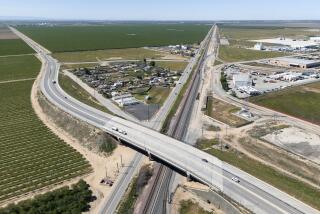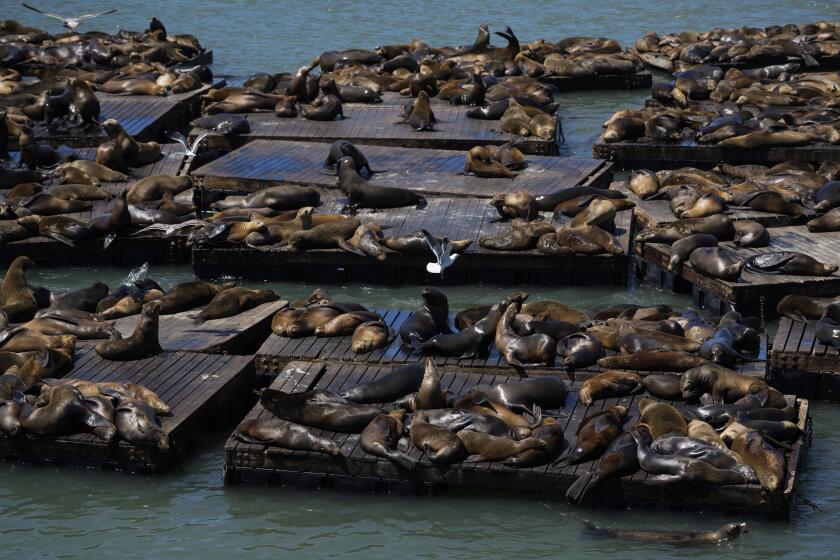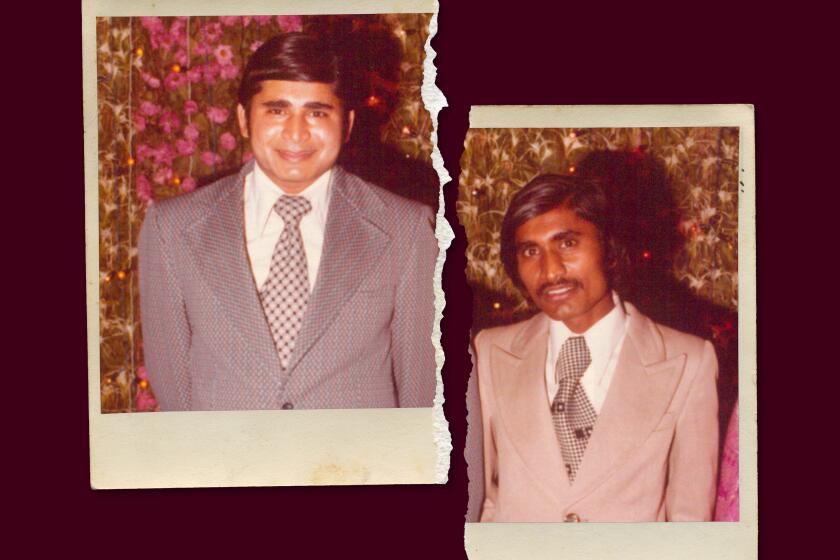SURF COUNTY, USA : SURF CITY: TIDES OF CHANGE
David M. Walden’s childhood was a surfer’s dream, not all that different from others who grew up in Surf City.
On school days, he raced off to the pier at dawn. For breakfast, he grabbed a hot roll and cola at the Sugar Shack, a corner cafe at Main Street and Olive Avenue. And then he “walked the board” on the waves with other teen-agers before heading to class at Huntington Beach High School.
On weekends, he surfed until the lifeguards hauled out the yellow flags to “blackball” the beach when the water became too crowded. At night, he caught some shows at the Golden Bear nightclub and sometimes took walks along the beach.
Nowadays, Walden is a 41-year-old vice president of a Newport Beach tax-consulting firm, trying to decide which side to take as his hometown undergoes a massive downtown remake.
As a businessman, Walden knows that redevelopment can bring in tourist dollars needed to revive the city’s flickering financial status. But as a Surf City old-timer, he is disheartened at seeing his old hangouts plowed under for flashy new buildings.
“I have a lot of ambivalence about this,” Walden said recently as he stood at the entrance to the city’s landmark pier. “We can never have the openness of the beachfront areas any more.”
Even the 76-year-old pier--closed since a fierce storm tore it up in 1988--faces the same fate as so many other oceanfront structures. The landmark--a focus of nostalgia for even new surfers--will be torn down in early September, to be replaced by a $12.8-million pier scheduled to open in spring of 1992.
Although it is still in metamorphosis, the city’s waterfront already looks dramatically different from the past. With millions of dollars pouring in from the city and developers, boutiques and condominiums are lining streets that once sported surf shops and watering holes. Along the beach, a $20.3-million luxury hotel--the Waterfront Hilton--is almost ready for its grand opening, and two restaurants are planned atop what are now parking lots.
The transformation of Surf City into a tourist attraction leaves a lot of people wary in Huntington Beach--once a sleepy oil industry town before Beach Boys sound-alikes Jan and Dean got ahold of it. Their “Surf City” was a No. 1 hit in the summer of ’63.
Unlike other surfing cities, Huntington Beach is situated along a windy bluff and not blessed with a picturesque coastline, says Steve Pezman, publisher of Surfer Magazine. Instead, the city’s biggest asset is its sand bars, which make surfing accessible year-round, unlike other beach towns that rely on seasonal changes for the waves to be ridable.
“Huntington Beach became known as a neat surfing destination,” Pezman said. “It was Surf Mecca.”
With the surfers came the fringes of the grass-roots surfing community--surfboard dealers, hamburger stand owners and clothing retailers who were able to rent cheap and simple storefronts simply because Huntington Beach was not considered prime coastal territory. The sport became the crutch for the city’s soft economic status, Pezman said.
Nowadays, the city has turned its back on surfing revenue and is concentrating instead on tourist dollars. Eager to take advantage of tourists in the area for the sights and sounds of Disneyland, Knott’s Berry Farm, and other Orange County attractions, Huntington Beach is laboring to overcome its laid-back image.
Mom and pop hamburger joints along the beach are slowly being replaced by restaurants serving mineral water and shiitake mushroom salads.
On Main Street near Pacific Coast Highway, Pierside Pavilion, a salmon pink Mediterranean village, is growing where the legendary Golden Bear club once made music with the likes of Donovan and Janis Joplin before succumbing to bankruptcy. Across the street stands Jack’s Surf Boards, which has been on the corner since the 1950s.
Surf Mecca’s time, says Pezman, is passing by.
“It’s sad but not entirely illogical,” said the magazine publisher, who used to own a surfboard repair shop in the city. “We fought and fought against redevelopment. But the economic pressure was so great.”
Still, while many old-time surfers grow nostalgic about the old downtown, Huntington Beach police say the area has caused them problems. Runaways have congregated in some of the old downtown buildings, and police occasionally have made drug- and prostitution-related arrests in the area. Several longtime residents of the city have testified before City Council meetings that they have been afraid to go into the old downtown after dark. The incumbent City Council has pledged to make the renovated downtown into a safe, well-lighted area, with new movie theaters and restaurants for residents to enjoy.
Change is “inevitable,” says Huntington Beach spokesman Bill Reed. Still, surfers will remain unaffected, officials say, because no matter what happens to businesses along Pacific Coast Highway, the attraction for surfers--waves--will remain. The view along the sand may change, but the sand bars will stay intact.
“Retail is going to cost higher and the food will cost more,” Reed said. “But what doesn’t cost more?”
But the city doesn’t have to change all that much, says Debbie Cook, spokeswoman for Save Our Parks, a grass-roots group opposed to any plan to alter the city’s beaches and parks.
Cook’s group has been trying to stop the city from building more restaurants and parking structures on the ocean side of Pacific Coast Highway near Main Street. Any new buildings would block the view and prevent people from watching the surfers at their best, Cook said.
“The city has been trying to get rid of surfers all along,” said Cook, who does not surf. “Surfers don’t spend money in the town. They (city officials) want tourists; they don’t want surfers.”
But Huntington Beach does not have a choice in the issue of redevelopment, says tax consultant Walden, who now lives in Carlsbad. As secretary to the city’s new International Surfing Museum Foundation, he visits Huntington Beach often and can’t help but reflect on the change. It is not all bad, he said.
“There’s still a 1960s flavor downtown,” Walden said. “Main Street still has a surfer’s point of view.”
He acknowledges that today’s teen-agers who surf in the city’s famous waves will never know the feeling of open space that he experienced years ago when riding in toward shore.
“Yes, you look at development and it is somewhat unfortunate,” Walden said. “But it will help bring in the needed revenue.”
“It’s sad but not entirely illogical. We fought and fought against redevelopment. But the
economic pressure was so great.”--Steve Pezman,
Surfer Magazine
“The city has been trying to get rid of surfers all along. Surfers don’t spend money in the town. They (city officials) want tourists; they don’t want surfers.”--Debbie Cook,
Save Our Parks
More to Read
Start your day right
Sign up for Essential California for news, features and recommendations from the L.A. Times and beyond in your inbox six days a week.
You may occasionally receive promotional content from the Los Angeles Times.






